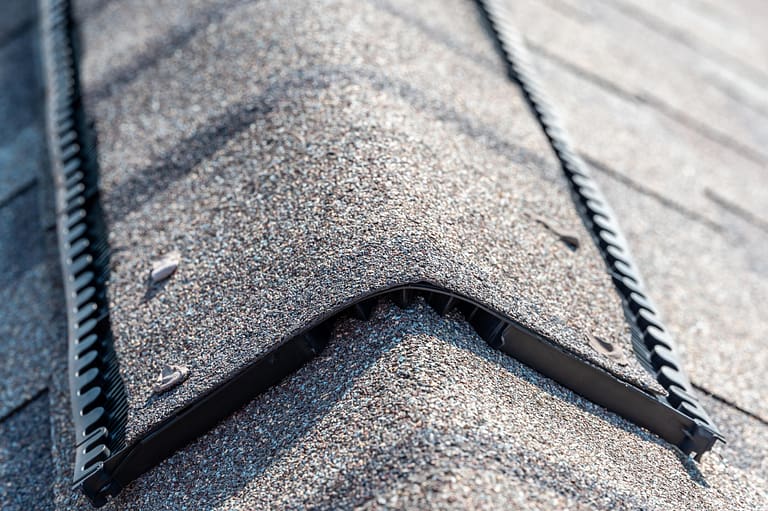
Metal roofs are increasingly favored among homeowners for their durability and energy efficiency. One crucial aspect often overlooked is insulation, which plays an indispensable role in optimizing a metal roof’s performance. In the chilly grasp of winter, proper insulation ensures a warm household, resisting the cold’s encroachment. Conversely, during the sweltering summer months, it’s insulation that fights to maintain a cool oasis within your home.
Inside this blog:
- The types of insulation
- Key factors to consider
- Expert tips
Understanding the scope of metal roof insulation can be a daunting task, with various products catering to different needs and budgets. This detailed guide explains metal roof insulation, presenting the three main types—spray foam, rigid board, and reflective insulation—and the critical factors to weigh when choosing. By the end of this article, you’ll be empowered to make the right decisions that will not only regulate your indoor climate, but also offer substantial savings on your energy bills.
The Core of Coziness: Types of Metal Roof Insulation
To optimally insulate your metal roof, you must select from one of three main insulation types, each with its own set of characteristics and benefits.

1. Spray Foam Insulation
Among the most efficient insulators available, spray foam can be either open-cell or closed-cell. Closed-cell foam, while pricier upfront, boasts superior insulating properties, a moisture barrier, and added structural integrity to the roof. Open-cell foam, more cost-effective, is lighter and more flexible, making it a good choice for irregular roof structures.
Benefits:
- Excellent thermal resistance (R-value)
- Fills gaps to seal your building envelope
- Lightweight (open-cell) or adds to structural strength (closed-cell)
Considerations:
- Professional installation is required for the best results
- Can off-gas during application, necessitating a brief evacuation
- Higher initial investment compared to other options
2. Rigid Board Insulation
Rigid board insulation, typically made from foam, provides a solid thermal barrier with exceptional stability. This type of insulation is suitable for DIY installation and can be outfitted with reflective surfaces to enhance its performance.
Benefits:
- High compressive strength, often used in flat roofs for support
- Easy to cut and install, optimal for do-it-yourselfers
- Can be reinforced with various-facing materials, including reflective barriers
Considerations:
- May require additional sealing for full thermal protection
- More challenging to fit around obstacles compared to spray foam
- Limited R-value per inch, which can lead to a thicker insulation profile
3. Reflective Insulation
Reflective insulation is a radiant barrier that reflects heat rather than absorbing it, effectively reducing heat gain in the summer. When supplemented with an air space, it can also provide an added layer of thermal resistance.
Benefits:
- Simple, quick installation
- Thin profile, making it the most space and weight-efficient
- Exceptional in hot climates, reducing attic temperatures significantly
Considerations:
- Depends on proper air spacing to achieve optimal performance
- Limited in regard to thermal resistance without airspace
- Less effective in cold climates where heat retention is necessary
Balancing the Scales of Home Comfort: Key Factors to Weigh
Determining the right insulation for your metal roof involves assessing several crucial factors. Your local climate, budget, installation requirements, and long-term maintenance all play roles in the decision-making process.
Climate Considerations
Your insulation’s performance must align with the climate it’s operating in. Closed-cell spray foam or rigid board insulation are well-suited for colder climates, providing high R-values and resistance to moisture. On the other hand, reflective insulation can be more beneficial in warm regions, where heat control is the primary objective.
Cost-Effectiveness Equation
While reflective insulation is the most budget-friendly option at the outset, considering the operational lifespan and long-term energy savings, spray foam insulation, particularly closed-cell, can often justify its higher initial cost. Rigid board insulation stands as a cost-effective compromise, with a balance of upfront cost and performance.
Installation Insights
Your choice of insulation will dictate the complexity of installation. Reflective insulation typically requires less labor. However, closed-cell foam insulation, being the most complex in terms of installation, necessitates professional expertise to achieve peak performance.
Longevity and Maintenance
The durability and maintenance requirements of the insulation option must harmonize with your expectations and the roof’s specifications. While rigid board and reflective insulation require minimal maintenance and can maintain their integrity for decades, spray foam insulation needs to be checked periodically for wear and damage.
Expert Tips for the Savvy Insulator
Insights from professionals in the roofing and insulation industry can guide you toward a successful metal roof insulation project. Rely on their expertise for optimal results and lasting comfort.
Quality Over Quantity
Ensure you prioritize the quality and appropriateness of your insulation over the quantity. A thicker insulation may not always provide superior performance if it’s not the right kind for your climate or property.
Ventilation Is Key
Appropriate ventilation is vital, especially with more airtight insulation like spray foam. It not only ensures a healthy indoor environment, but also prevents moisture buildup, safeguarding your roof’s structure.
Consider the Building Envelope
The insulation should work in harmony with the rest of your building’s envelope, including walls and other structures. A consistent approach to insulation is essential for effective climate control.
Professional Consultation
Seeking professional guidance can save you time, money, and the potential headaches of incorrect installation. A qualified roofer or insulation specialist can provide personalized advice based on your specific situation.
We’re Metal Roofing Experts
Your metal roof’s performance relies on the insulation beneath it. By understanding the nuances of the available options and considering the climate, cost, installation, and maintenance, you can craft an efficient insulation solution.
To those homeowners ready to take the next step toward a cozier home and a greener economy, Shingle and Metal Roofs LLC stands ready to help. Contact us for an estimate on your metal roof insulation project. With knowledge in hand and experts by your side, you’re poised to weather any season in comfort and style.






